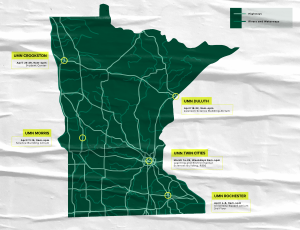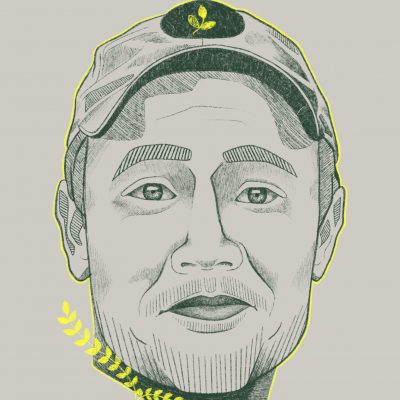Introduction
Joe Warren
As Chimamanda Ngozi Adichie so powerfully pointed out in her 2009 Ted Talk, “Stories matter. Many stories matter. Stories have been used to dispossess and to malign. But stories can also be used to empower, and to humanize. Stories can break the dignity of a people. But stories can also repair that broken dignity.”
This ebook is part of the IonE Educators’ Collective Action and follows an exhibition by the same name that travelled across Minnesota to each of the 5 UMN campuses in March and April of 2022. The ebook is another intepretation of the projects displayed for the exhibition. Both are about stories and the environment; they are about how we tell the stories of our innovative teaching in sustainability and environmental education; they are about the stories we can marshal to encourage action in the face of an imminent climate catastrophe; they are about the stories our students tell themselves and us through their work engaging the environment; and they are about the stories we humans are currently writing about ourselves in the Anthropocene.
The general focus of this collection is on the human-nature relationship. Matt asks students to rethink their understanding of, and relationship to, insects. Jessie challenges students to unpack the connection between our health and the environment. Sheila works to nurture positive attitudes to nature in children. Susan highlights more sustainable relations between food and environmental and human health. Reba asks people to creatively immerse themselves in their environment in order to deepen their relationship with it. I hope this collection encourages you to nourish that relationship, too.
A deeper knowledge of the human-nature relationship necessitates a deeper knowledge of the history of the land. The Twin Cities campus I work and study on is situated on the traditional, ancestral, and contemporary lands of the Dakota.

As a South African citizen who grapples with our colonial and Apartheid history, I know that our present is inflected by our past. I acknowledg e that I have benefited from Apartheid and I strive to contribute to a more equal society in reparation for that unearned benefit. With Filipino heritage, I know something of being an ‘other’ too. It is with both these knowledges that I have tried to grapple with my presence in this state and on this land. I know that I am a visitor here. I know that the University was granted this land with coerced treaties that were later not honored or fulfilled. It is my hope that in acknowledging this fact I am able to honor the indigenous people of these lands and support the University in moving towards reconciliation for a harmful past and active striving towards redressing the effects of that past.
Why an exhibition and an ebook?
Often, in academia, we are tempted to tell stories in traditional ways – think the commonly used 5-chapter structure of a thesis or the standard form of an academic article. However, in early discussions, this cohort indicated strongly that they wished to tell their stories in a more creative way (though nobody followed through on dance as a form of storytelling!). In retrospect, it appears this desire was rooted in their creative engagements with their own students. From websites designed to promote community building, to digital art-based curricula, to drawing, journaling, and model building, each educator has displayed a drive to incorporate creativity in teaching students in their field. And if entomology, child development, health, food systems, and ecology can do it, then any discipline can.
We hope that this exhibition will inspire all you educators to find innovative ways to engage your students as well as creative ways to incorporate aspects of sustainability into your curriculum. What will your story be?


